The history of English language(英汉双语)
The History of English
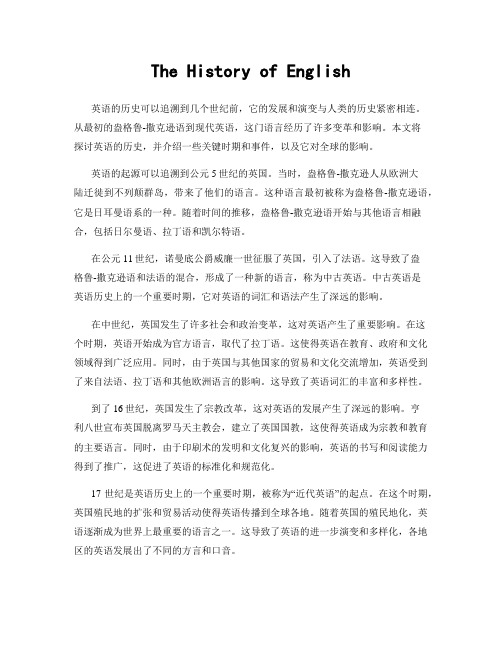
The History of English英语的历史可以追溯到几个世纪前,它的发展和演变与人类的历史紧密相连。
从最初的盎格鲁-撒克逊语到现代英语,这门语言经历了许多变革和影响。
本文将探讨英语的历史,并介绍一些关键时期和事件,以及它对全球的影响。
英语的起源可以追溯到公元5世纪的英国。
当时,盎格鲁-撒克逊人从欧洲大陆迁徙到不列颠群岛,带来了他们的语言。
这种语言最初被称为盎格鲁-撒克逊语,它是日耳曼语系的一种。
随着时间的推移,盎格鲁-撒克逊语开始与其他语言相融合,包括日尔曼语、拉丁语和凯尔特语。
在公元11世纪,诺曼底公爵威廉一世征服了英国,引入了法语。
这导致了盎格鲁-撒克逊语和法语的混合,形成了一种新的语言,称为中古英语。
中古英语是英语历史上的一个重要时期,它对英语的词汇和语法产生了深远的影响。
在中世纪,英国发生了许多社会和政治变革,这对英语产生了重要影响。
在这个时期,英语开始成为官方语言,取代了拉丁语。
这使得英语在教育、政府和文化领域得到广泛应用。
同时,由于英国与其他国家的贸易和文化交流增加,英语受到了来自法语、拉丁语和其他欧洲语言的影响。
这导致了英语词汇的丰富和多样性。
到了16世纪,英国发生了宗教改革,这对英语的发展产生了深远的影响。
亨利八世宣布英国脱离罗马天主教会,建立了英国国教,这使得英语成为宗教和教育的主要语言。
同时,由于印刷术的发明和文化复兴的影响,英语的书写和阅读能力得到了推广,这促进了英语的标准化和规范化。
17世纪是英语历史上的一个重要时期,被称为“近代英语”的起点。
在这个时期,英国殖民地的扩张和贸易活动使得英语传播到全球各地。
随着英国的殖民地化,英语逐渐成为世界上最重要的语言之一。
这导致了英语的进一步演变和多样化,各地区的英语发展出了不同的方言和口音。
到了18世纪和19世纪,英国的工业革命和科学进步对英语的发展产生了巨大影响。
科学、技术和工业术语的出现丰富了英语的词汇。
同时,英国的文学和艺术繁荣,众多作家和诗人的作品使得英语的文学价值得到了全球的认可。
The History of English__ LanguagePPT课件

Indo-European and Germanic Influences English is a member of the Indo-European family of languages. This broad family includes most of the European languages spoken today. The IndoEuropean family includes several major branches: Latin and the modern Romance languages; The Germanic languages; The Indo-Iranian languages, including Hindi and Sanskrit;( 印地语; 梵语) The Slavic languages; ( 斯拉夫语) The Baltic languages of Latvian and Lithuanian) ( 波 罗地,拉脱维亚,立陶宛) The Celtic languages; Greek.
The Norman Conquest and Middle English (11001500) William the Conqueror, the Duke of Normandy, invaded and conquered England and the AngloSaxons in 1066 AD. The new overlords spoke a dialect of Old French known as Anglo-Norman. The Normans were also of Germanic stock and Anglo-Norman was a French dialect that had considerable Germanic influences in addition to the basic Latin roots.
History of the English Language
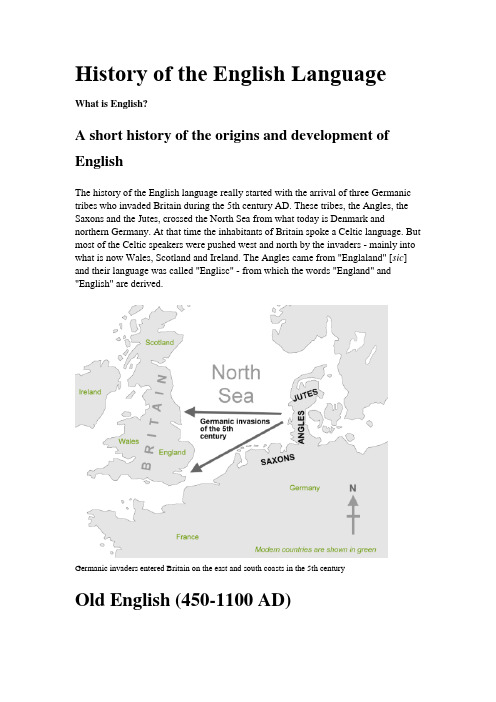
History of the English LanguageWhat is English?A short history of the origins and development of EnglishThe history of the English language really started with the arrival of three Germanic tribes who invaded Britain during the 5th century AD. These tribes, the Angles, the Saxons and the Jutes, crossed the North Sea from what today is Denmark and northern Germany. At that time the inhabitants of Britain spoke a Celtic language. But most of the Celtic speakers were pushed west and north by the invaders - mainly into what is now Wales, Scotland and Ireland. The Angles came from "Englaland" [sic] and their language was called "Englisc" - from which the words "England" and "English" are derived.Germanic invaders entered Britain on the east and south coasts in the 5th centuryOld English (450-1100 AD)The invading Germanic tribes spoke similar languages, which in Britain developed into what we now call Old English. Old English did not sound or look like English today. Native English speakers now would have greatdifficulty understanding Old English. Nevertheless, about half of the most commonly used words in Modern English have Old English roots. The words be , strong and water , forexample, derive from Old English. Old English was spoken until around 1100.Middle English (1100-1500)In 1066 William the Conqueror, the Duke of Normandy (part of modern France), invaded and conqueredEngland. The new conquerors (called the Normans) brought with them a kind of French, which became the language of the Royal Court, and the ruling and business classes. For a period there was a kind of linguistic class division, where the lower classes spoke English and the upper classes spoke French. In the 14th century English became dominant in Britain again, but with many French wordsadded. This language is called Middle English. It was the language of the great poet Chaucer (c1340-1400), but it would still be difficult for native English speakers to understand today.Modern EnglishEarly Modern English (1500-1800)Towards the end of Middle English, a sudden and distinct change in pronunciation (the Great Vowel Shift) started, with vowels being pronounced shorter and shorter.Part of Beowulf , a poem written in Old English An example of Middle English by ChaucerFrom the 16th century the British had contact with many peoples from around the world.This, and the Renaissance of Classical learning, meant that many new words and phrases entered the language. The invention of printing also meant that there was now a common language in print. Books became cheaper and more people learned to read. Printing also brought standardization to English. Spelling and grammar became fixed, and the dialect of London, where most publishinghouses were, became the standard. In 1604 the first English dictionary was published. Late Modern English (1800-Present)The main difference between Early Modern English and Late Modern English is vocabulary. Late Modern English has many more words, arising from two principal factors: firstly, the Industrial Revolution and technology created a need for new words; secondly, the British Empire at its height covered one quarter of the earth's surface, and the English language adopted foreign words from many countries.Varieties of EnglishFrom around 1600, the English colonization of North America resulted in the creation of a distinct American variety of English. Some English pronunciations and words "froze" when they reached America. In some ways, American English is more like the English of Shakespeare than modern British English is. Some expressions that the British call "Americanisms" are in fact original British expressions that were preserved in the colonies while lost for a time in Britain (for example trash for rubbish, loan as a verb instead of lend, and fall for autumn; another example,frame-up , was re-imported into Britain through Hollywood gangster movies). Spanish also had an influence on American English (and subsequently British English), with words like canyon , ranch , stampede and vigilante being examples of Spanish words that entered English through the settlement of the American West. French words(through Louisiana) and West African words (through the slave trade) also influenced American English (and so, to an extent, British English).Hamlet's famous "To be, or not to be" lines, written inEarly Modern English by ShakespeareToday, American English is particularly influential, due to the USA's dominance of cinema, television, popular music, trade and technology (including the Internet). But there are many other varieties of English around the world, including for example Australian English, New Zealand English, Canadian English, South African English, Indian English and Caribbean English.The Germanic Family of LanguagesEnglish is a member of the Germanic family of languages. Germanic is a branch of the Indo-European language family.。
The History of English Language
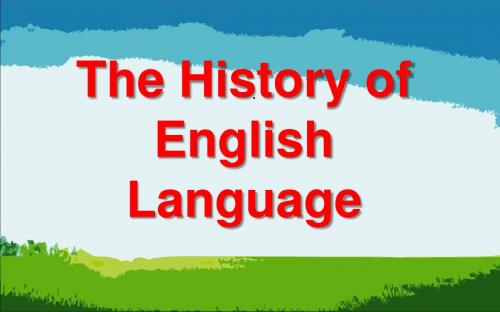
.
Questions: .
1:How many language families in the world? 2:Which language familiy does English belong to?
Indo-European family印欧语系 . Sino-Tibetan family汉藏语系 Altaic family阿尔泰语系 Semito-Hamitic family闪-含语系 Ural language family乌拉尔语系 Ibero - Caucasus family高加索语系 Dravidian family达罗毗荼语系 Austro-Asiatic family南亚语系 Austronesia family 南岛语系
Bede and His Works
Bede(673-735) also referred to as Saint Bede or the Venerable Bede . . Anglo-Saxon He is widely regarded as the greatest of all the scholars. He wrote around 40 books mainly dealing with theology and history.
The evolution of old english (500-1100AD)
Also influencing English at this time were the Vikings. Norse invasions and settlement, beginning around 850, brought many North Germanic words into the language, particularly in the north of England. Some examples are dream, which had meant 'joy' until the Vikings imparted its current meaning on it from the Scandinavian cognate draumr, and skirt, which continues to live alongside its native English cognate shirt.
英语的发展史和介绍
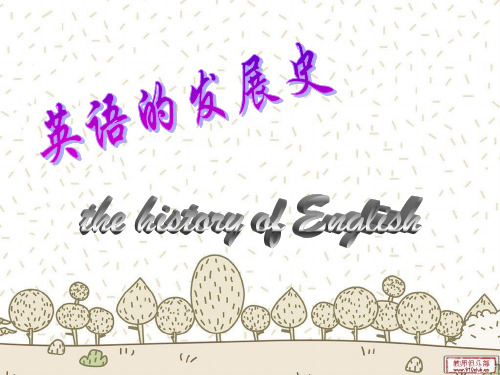
英语的历史从1500多年前的北欧开始。 在公元5世纪左右,称为盎格 鲁人、撒克逊人和朱特人的部落从德国和丹麦旅行向西过北海。他们 迁入英国,并在7世纪末以前,他们所讲的即为早期形式的英语。
Middle English
AD1100—AD1500
In 1066, the Normans conquered England. French became the language of the wealthy and powerful, and English was spoken mostly by poorer people. In the late fourteenth century, English became the first language again. By this time, many words used in English came from French or Latin, and a lot of the early words no
Modern English
In the Renaissance(文艺t in ancient Greece and ancient Roman culture .English has absorbed a large number of ancient society culture. vocabulary has greatly increased.
• 公元1066年,法国的诺曼蒂公爵侵人英 国,在诺曼蒂王朝统治期间,英国实际 上存在着三种语言:法语,拉丁语,英语, 但是英语只是下层社会劳动者用的世俗 语言。法语在英国的特殊地位一直延续 到14世纪。
• 1382年用英语书写的圣经出现,才结束 了拉丁语的宗教语言地位。这时英语才 成为英国的全民语言。因此英语中保留 着大量的法语词汇(如age,air,brush, cry,bourgeoisie)和拉丁语词汇 (angel,candle,moke,pope)。
the_history_of_English_Language课件
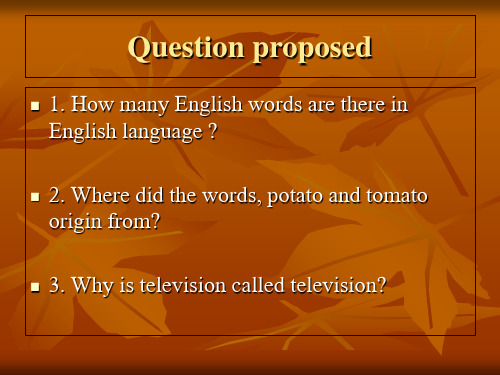
The number of modern English words 200,000
Questions
What do you think is the characters of development of English language ?
Question proposed
1. How many English words are there in English language ?
The Influences on Old English:
tin
Latin is first introduced into English when England was under the conquer of Romans Empire before 3rd century.
.
Literature---
stanza, canto
Art---
studio, vista, replica
Music---
opera, solo, alto, piano
Shakespeare’ works
Later Modern English
The influence of Industrialization and colonization: (1800-)
Characters of English
L:anguage of this time
Large number of foreign language absorbed into English language
Turkey and Arabia: coffee, cotton, turban… Persia: bazaar, pajama Far East: Tea, bamboo, curry, sago .. North America: potato, tomato
The history of English language(英语历史)【高英第二册第一课相关索引】
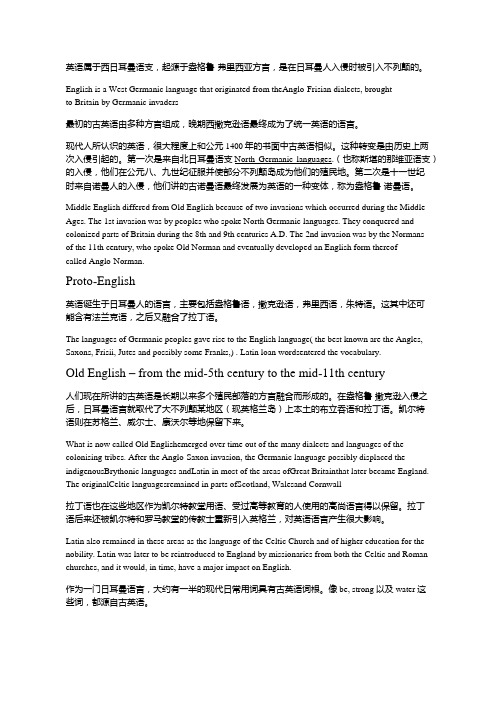
英语属于西日耳曼语支,起源于盎格鲁-弗里西亚方言,是在日耳曼人入侵时被引入不列颠的。
English is a West Germanic language that originated from theAnglo-Frisian dialects, broughtto Britain by Germanic invaders最初的古英语由多种方言组成,晚期西撒克逊语最终成为了统一英语的语言。
现代人所认识的英语,很大程度上和公元时来自诺曼人的入侵,他们讲的古诺曼语最终发展为英语的一种变体,称为盎格鲁-诺曼语。
Middle English differed from Old English because of two invasions which occurred during the Middle Ages. The 1st invasion was by peoples who spoke North Germanic languages. They conquered and colonized parts of Britain during the 8th and 9th centuries A.D. The 2nd invasion was by the Normans of the 11th century, who spoke Old Norman and eventually developed an English form thereofcalled Anglo-Norman.Proto-English英语诞生于日耳曼人的语言,主要包括盎格鲁语,撒克逊语,弗里西语,朱特语。
这其中还可能含有法兰克语,之后又融合了拉丁语。
The languages of Germanic peoples gave rise to the English language( the best known are the Angles, Saxons, Frisii, Jutes and possibly some Franks,) . Latin loan wordsentered the vocabulary.Old English – from the mid-5th century to the mid-11th century人们现在所讲的古英语是长期以来多个殖民部落的方言融合而形成的。
History of English

The Celts found too late that their new allies had become their conquerors. Fierce seesaw battles raged for some 200 years as the Celts resisted the invasion.
The vowels of OE would probably sound more like those of modern European languages such as German than like Modern English vowels.
2.1.5.3 The vocabulary of OE
2.1.5.2 The pronunciation of OE
The consonants of OE would be similar to those of Modern English in many ways, but there would be differences. One difference is that: The [h] that is little more than a breath in Mod.E would be a tighter, more distinct sound in OE—a close approximation is the sound represented by the ch in the Scottish word loch (lake).
2.1.4 The Danish influence
About 790 the Danes became a serious threat to England. Battles between the English and the Danes raged for nearly ninety years. Alfred the Great led his people fighting against them. At last the Danes gained the upper hand. The exciting tales of this period have come down to us in the story of Beowulf.
the history of English language英语语言发展历史

•
The history of the English language really started with the arrival of three Germanic tribes who invaded Britain during the 5th century AD. These tribes, the Angles, the Saxons and the Jutes, crossed the North Sea from what today is Denmark and northern Germany. At that time the inhabitants of Britain spoke a Celtic language. But most of the Celtic speakers were pushed west and north by the invaders - mainly into what is now Wales, Scotland and Ireland. The Angles came from Englaland and their language was called Englisc - from which the words England and English are derived. • 英语真正的历史应该从公元5世纪时入侵英国的三个日耳曼部 落说起. 这几个部落分别是, 盎格鲁人, 撒克逊人,和朱特人,他 们从今天的德国北部和丹麦出发,然后横渡北海。那时候英国 的本地居民都说凯尔特语。但由于入侵者的逼迫,他们都被赶 到了西部和北部-主要是现在的威尔士,苏格兰和爱尔兰。盎格 鲁人来自 Englaland 他们的语言称为 Englisc (古英语) - 这两个 词就是现在England和English的前身。
英语的形成与发展介绍(中英双语)PPT
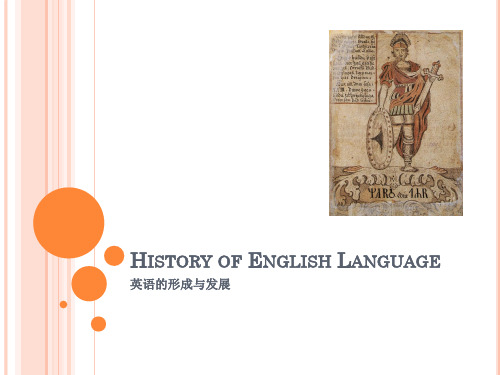
OLD ENGLISH (450 - 1100 AD):
Around 878 AD Danes and Norsemen, also called Vikings, invaded the country and English got many Norse words into the language, particularly in the north of England. The Vikings,
Some, such as church, bishop, baptism, monk, eucharist and presbyter came indirectly through
Latin from the Greek.
597年圣奥古斯丁的到来以及基督教传入撒克逊英格 兰,使更多的拉丁语单词进入英语。他们主要关注 教会政要的命名、仪式等。一些,如教堂、主教、 洗礼、僧侣、圣餐和长老会,间接通过拉丁语从希 腊语传来。
OLD ENGLISH (450 - 1100 AD):
The influence of Celtic upon Old English was slight. In fact, very few Celtic words have lived on in the English language. But many of place
English poem and it is notable for its length -
3,183 lines. Experts say "Beowulf" was written in
Britain more than one thousand years ago. The name of the person who wrote it is unknown.
英语语言史albert baugh中文版

英语语言史是一本介绍英语语言演变和发展历史的重要著作,其对于理解英语语言的起源和变迁具有重要的学术意义。
其中,albert baugh(阿尔伯特·鲍)是该书的作者,该书内容翔实、详尽,涵盖了英语语言的起源、词汇、语法、音韵等方面的发展历程。
本文将就英语语言史albert baugh中文版展开一系列的介绍和分析,帮助读者更好地了解该书的内容和价值。
一、书名及作者简介《英语语言史》(A History of the English Language)是由albert baugh撰写的英语语言发展史著作,是该领域的经典之作。
albert baugh(1885-1981)是一位著名的语言学家和文学评论家,曾担任美国宾夕法尼亚大学英语语言学教授,并对英语语言的演变和历史做出了重要的贡献。
二、书籍内容概述该书分为多个部分,涵盖了英语语言发展的多个方面,主要内容包括:1. 英语语言的起源和发展历程,包括古英语、中古英语、近代英语等时期的语言特点和演变过程;2. 英语词汇的演变和扩展,包括词源、借词和词汇的意义变迁等方面的内容;3. 英语语法和句法结构的发展,包括语法规则的变化和演变,句式和结构的变化等;4. 英语语音和音韵的演变,包括发音规律、重音变化和音位的演变等。
三、研究意义和价值英语语言史albert baugh中文版作为一部全面系统地介绍英语语言发展史的著作,具有重要的研究意义和价值,主要体现在以下几个方面:1. 帮助读者了解英语语言的起源和发展历程,从历史的角度全面把握英语语言的发展;2. 提供丰富的语言数据和案例,有助于研究者进行英语语言历史和演变的深入研究;3. 为相关学科的学者和研究者提供了重要的参考资料和研究工具,有利于推动英语语言史研究的进展。
四、书籍对读者的启发和影响英语语言史albert baugh中文版作为一部重要的学术著作,对读者有着深远的启发和影响,主要体现在以下几个方面:1. 帮助读者深入了解英语语言的演变和变迁,增进对英语语言历史的理解和认识;2. 拓展读者的学术视野,帮助读者更好地把握英语语言史研究的前沿动态和发展趋势;3. 为读者提供丰富的学术资源和文献参考,有利于读者开展相关研究工作,提高学术研究的水平和质量。
英语发展史 the history of English
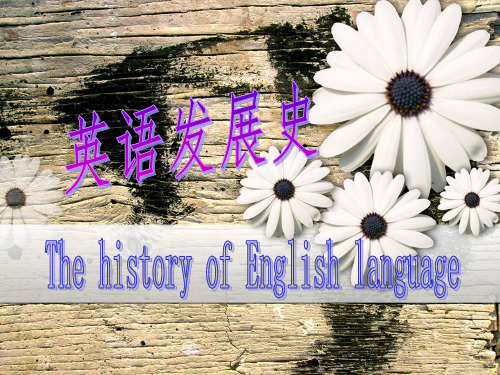
In the late eighth century, the Vikings attacked England. Fighting continued for years. During this time, almost two hundred many Latin, Danish, and Norse words entered the English language. Latin gave English words like kitchen and cup. From Danish and Norse, English borrowed skin, leg, they. many synonyms from the Norse language became integrated into English, for example, wrath(English),anger(Norse);sick(English),i ll(Norse).
古英语的词汇有着浓厚的日尔曼语族的特点。这主
要表现为复合法是重要的构词方法。复合词在古英
语词汇中占有显著的地位。据统计,在史诗《贝奥 武夫》3183行诗句中,竟有1069个复合词。有些复 合词中不重读部分,渐渐失去了独立地位,而演变 成了词缀,如for-, in-, -ful 等派生法在古英语中也 广泛使用。共有二十四个名词后缀、十五个形容词 后缀,-dom, -hood, -ship, -ness, -the, -ful,- ish 等词缀都可溯源到古英语时期。古英语时期的诗歌 有一种特殊的修辞手法,即头韵(alliteration),
AHistoryoftheEnglishLanguage
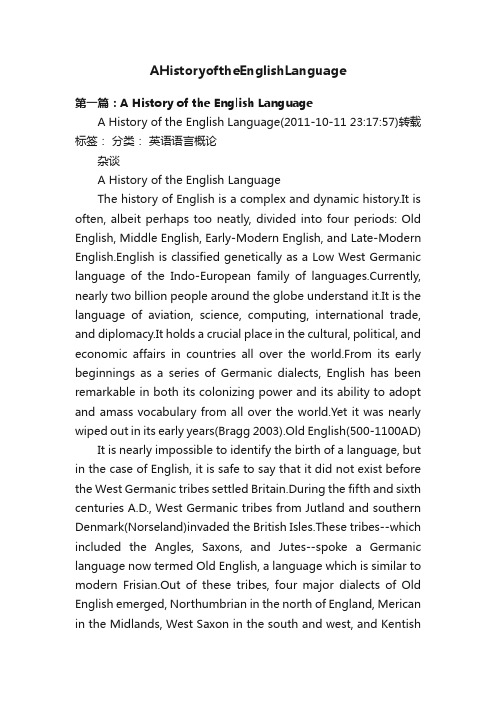
AHistoryoftheEnglishLanguage第一篇:A History of the English LanguageA History of the English Language(2011-10-11 23:17:57)转载标签:分类:英语语言概论杂谈A History of the English LanguageThe history of English is a complex and dynamic history.It is often, albeit perhaps too neatly, divided into four periods: Old English, Middle English, Early-Modern English, and Late-Modern English.English is classified genetically as a Low West Germanic language of the Indo-European family of languages.Currently, nearly two billion people around the globe understand it.It is the language of aviation, science, computing, international trade, and diplomacy.It holds a crucial place in the cultural, political, and economic affairs in countries all over the world.From its early beginnings as a series of Germanic dialects, English has been remarkable in both its colonizing power and its ability to adopt and amass vocabulary from all over the world.Yet it was nearly wiped out in its early years(Bragg 2003).Old English(500-1100AD) It is nearly impossible to identify the birth of a language, but in the case of English, it is safe to say that it did not exist before the West Germanic tribes settled Britain.During the fifth and sixth centuries A.D., West Germanic tribes from Jutland and southern Denmark(Norseland)invaded the British Isles.These tribes--which included the Angles, Saxons, and Jutes--spoke a Germanic language now termed Old English, a language which is similar to modern Frisian.Out of these tribes, four major dialects of Old English emerged, Northumbrian in the north of England, Merican in the Midlands, West Saxon in the south and west, and Kentishin the Southeast.These tribes, along with the English language, may well have been wiped out altogether by Viking raiders if not for a Wessex king named Alfred the Great.After defeating the Vikings, who threatened both the English way of life and its language, Alfred the Great encouraged English literacy throughout his kingdom(McCrum, et al 1986).Before the Germanic tribes arrived, the Celts were the original inhabitants of Britain.When the Germanic tribes invaded England, they pushed the Celt-speaking inhabitants out of England into what is now Scotland, Wales, Cornwall, and Ireland.The Celtic language survives today in the Gaelic languages, and some scholars speculate that the Celtic tongue might have influenced the grammatical development of English, though the influence would have been minimal(Bryson 1990).Around A.D.850, Vikings or Norsemen made a significant impact on the English language by importing many North Germanic words into the language.From the middle of the ninth century, large numbers of Norse invaders settled in Britain, especially in the northern and eastern areas and, in the eleventh century, a Danish(Norse)King, Canute, ruled England.The North Germanic speech of the Norsemen had a fundamental influence on English.They added basic words such as “that,” “they,” and “them,” and also may have been responsible for some of the morphological simplification of Old English, including the loss of grammatical gender and cases(Bragg 2003).The majority of words that constitute Modern English do not come from Old English roots(only about one sixth of known Old English words have descendants surviving today), but almost all of the 100 most commonly used words in modern English do have Old English roots.Words like “water,” “strong,” “the,” “of,” “a,” “he”“no” and many other basic modern English words derive from Old English(Bragg 2003).Still, the English language we know today is a far cry from its Old English ancestor.This is evidenced in the epic poem Beowulf, which is the best known surviving example of Old English(McCrum, et al 1986), but which must be read in translation to modern English by all but those relative few who have studied the work in the original.The Old English period ended with the Norman Conquest, when the language was influenced to an even greater extent by the French-speaking Normans.The Norman Conquest and Middle English(1100-1500)In 1066, William the Conqueror, Duke of Normandy, invaded and conquered England and the Anglo-Saxons.After the invasion, the Norman kings and the nobility spoke a dialect of Old French known as Anglo-Norman, while English continued to be the language of the common people.This class distinction can still be seen in the English language today in words such as “beef” vs.“cow” and “pork” vs.“pig.” The aristocracy commonly ate beef and pork, which are derivatives of Anglo-Norma, while the Anglo-Saxon commoners, who tended the cattle and hogs, retained the Germanic and ate cow and pig.Many legal terms, such as “indict,” “jury,” and “verdict” also have Anglo-Norman roots because the Normans ruled the courts.It was not uncommon for French words to replace Old English words;for example, “uncle” replaced “eam” and “crime” replaced “firen.” French and English also combined to form new words, such as the French “gentle” and the Germanic “man” forming “gentleman”(Bryson1990).To this day, French-based words hold a more official connotation than do Germanic-based ones.When the English King John lost the province of Normandy to the King of France in 1204, the Normannobles of England began to lose interest in their properties in France and began to adopt a modified English as their native tongue.When the bubonic plague devastated Europe, the dwindling population served to consolidate wealth.The old feudal system crumbled as the new middle class grew in economic and social importance as did their language in relation to Anglo-Norman.The highly inflected system of Old English gave way to, broadly speaking, the same system of English found today which, unlike Old English, does not use distinctive word endings.Unlike Old English, Middle English can be read(albeit with some difficulty)by modern English speakers.By 1362, the linguistic division between the nobility was largely over and the Statue of Pleading was adopted, making English the language of the courts and Parliament.Edward the III became the first king to address Parliament in English in 1362, and the first English government document to be published in English since the Norman Conquest was the Provisions of Oxford.And the most famous literary example of Middle English is Chaucer’s Canterbury Tales.The Middle English period came to a close around 1500 with the rise of Modern English(McCrum, et al 1986).Early Modern English(1500-1800)The Renaissance brought with it widespread innovation in the English language.The rediscovery of classical scholarship created an influx of classical Latin and Greek words into the language.While Latin and Greek borrowings diversified the language, some scholars adopted Latin terms awkwardly and excessively, leading to the derogatory term “inkhorn.” An important item for scholars, an inkhorn was simply a horn pot that held ink for quills...but later it became a deprecatory term for pedantic writers who borrowed obscure and opulent termssuch as “revoluting” and “ingent affability”(Bragg 2003).The invention of the printing press also marked the division from Old English to Modern English as books became more widespread and literacy increased.Soon publishing became a marketable occupation and books written in English were often more popular than books in Latin.The printing press also served to standardize English.The written and spoken language of London already influenced the entire country, and with the influence of the printing press, London English soon began to dominate.Indeed, London standard became widely accepted, especially in more formal context.Soon English spelling and grammar were fixed and the first English dictionary was published in 1604(Bryson 1990).In the fifteenth century, the Great Vowel Shift--a series of changes in English pronunciation--further changed the English language.These purely linguistic sound changes moved the spoken language away from the so-called “pure” vowel sounds which still characterize many Continental languages today.Consequently, the phonetic pairings of most long and short vowel sounds were lost, resulting in the oddities of English pronunciation and obscuring the relationship of many English words and their foreign roots.The Great Vowel Shift was rather sudden and the major changes occurred within a century, though the shift is still in process and vowel sounds are still shortening, albeit much more gradually.The causes of the shift are highly debated.Some scholars argue that such a shift occurred due to the “massive intake of Romance loanwords so that English vowels started to sound more like French loanwords.Other scholars suggest it was the loss of inflectional morphology that started the shift”(Bragg 2003).Late-Modern English(1800-Present)The pronunciation, grammar, and spelling of Late-Modern English are essentially the same as Early-Modern English, but Late-Modern English has significantly more words due to several factors.First, discoveries during the scientific and industrial revolutions created a need for a new vocabulary.Scholars drew on Latin and Greek words to creat e new words such as “oxygen,” “nuclear,” and “protein.” Scientific and technological discoveries are still ongoing and neologisms continue to this day, especially in the field of electronics and computers.Just as the printing press revolutionized both spoken and written English, the new language of technology and the Internet places English in a transition period between Modern and Postmodern.Second, the English language has always been a colonizing force.During the medieval and early modern periods, the influence of English quickly spread throughout Britain, and from the beginning of the seventeenth century on, English began to spread throughout the world.Britain’s maritime empire and military influence on language(especially after WWII)has consequently been significant.Britain’s complex colonization, exploration, and overseas trade both imported loanwords from all over the world(such as “shampoo,” “pajamas,” and “yogurt”)and also led to the development of new varieties of English, each with its own nuances of vocabulary, grammar, and pronunciation.Significantly, one of England’s colonies, America, created what is known as American English and, in some respects, American English is closer to the English of Shakespeare than the modern Standard British English(or the modern Queen’s English)because many Americanisms are originally British expressions that were preserved in the colonies while lost at home(e.g., “trash” for “rubbish”).Native American andSpanish vocabulary have also been a great influence on American English, importing or adopting such words as “raccoon,” “canoe,” “mustang,” “ranch,” and “vigilante”(Bragg 2003).Global EnglishRecently, English has become a lingua franca, a global language that is regularly used and understood by many countries where English is not the first/native language.In fact, when Pope John Paul II went to the Middle East to retrace Christ’s footsteps and addressed Christians, Muslims, and Jews, the Pope didn’t speak Arabic, Italian, Hebrew, or his native Polish;instead, he spoke in English.In fact, English is used in over 90 countries, and it is the working language of the Asian trade group ASEAN and of 98 percent of international research physicists and chemists.It is also the language of computing, international communication, diplomacy, and navigation.Over one billion people worldwide are currently learning English, making it unarguably a global language.--Posted January 27, 2008ReferencesBragg, Melvyn.2003.The Adventure of English: The Biography of a Language.New York: Arcade Publishing.Bryson, Bill.1990.Mother T ongue: English and How it Got That Way.New York: Perennial.McCrum, Robert, William Cran, and Robert MacNeil.1986.The Story of English.New York: Viking.。
大学英语——The history of English

Britain 、Ireland the United States 、 Canada Australia 、 New Zealand many smaller former colonies
Modern English, similar in many aspects to the English spoken today, was in place by the late 17th century. The English language came to be exported to other parts of the world through British colonization, and is now the dominant language in Britain and Ireland, the United States and Canada, Australia, New Zealand and many smaller former colonies, as well as being widely spoken in India, parts of Africa, of the Anglo-Saxon era developed into Middle English, which was spoken from the Norman Conquest era to the late 15th century.
A significant influence on the shaping of Middle English came from contact with the North Germanic languages spoken by the Scandinavians who conquered and colonized parts of Britain during the 8th and 9th centuries; this contact led to much lexical borrowing and grammatical simplification.
英语The history of the English language
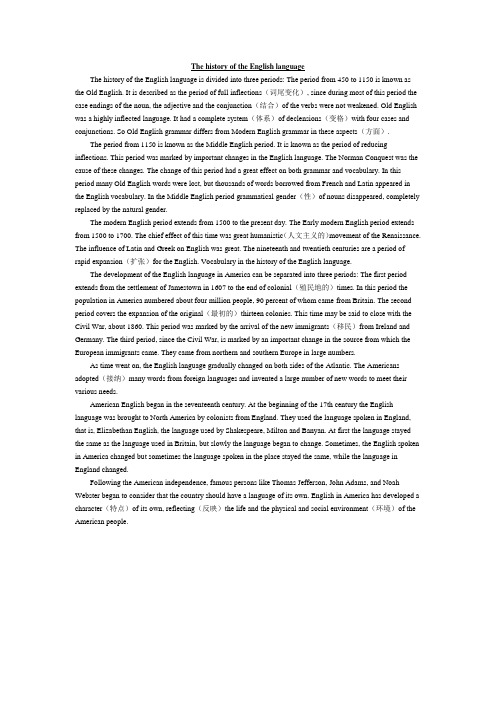
The history of the English languageThe history of the English language is divided into three periods: The period from 450 to 1150 is known as the Old English. It is described as the period of full inflections(词尾变化), since during most of this period the case endings of the noun, the adjective and the conjunction(结合)of the verbs were not weakened. Old English was a highly inflected language. It had a complete system(体系)of declensions(变格)with four cases and conjunctions. So Old English grammar differs from Modern English grammar in these aspects(方面).The period from 1150 is known as the Middle English period. It is known as the period of reducing inflections. This period was marked by important changes in the English language. The Norman Conquest was the cause of these changes. The change of this period had a great effect on both grammar and vocabulary. In this period many Old English words were lost, but thousands of words borrowed from French and Latin appeared in the English vocabulary. In the Middle English period grammatical gender(性)of nouns disappeared, completely replaced by the natural gender.The modern English period extends from 1500 to the present day. The Early modern English period extends from 1500 to 1700. The chief effect of this time was great humanistic(人文主义的)movement of the Renaissance. The influence of Latin and Greek on English was great. The nineteenth and twentieth centuries are a period of rapid expansion(扩张)for the English. Vocabulary in the history of the English language.The development of the English language in America can be separated into three periods: The first period extends from the settlement of Jamestown in 1607 to the end of colonial(殖民地的)times. In this period the population in America numbered about four million people, 90 percent of whom came from Britain. The second period covers the expansion of the original(最初的)thirteen colonies. This time may be said to close with the Civil War, about 1860. This period was marked by the arrival of the new immigrants(移民)from Ireland and Germany. The third period, since the Civil War, is marked by an important change in the source from which the European immigrants came. They came from northern and southern Europe in large numbers.As time went on, the English language gradually changed on both sides of the Atlantic. The Americans adopted(接纳)many words from foreign languages and invented a large number of new words to meet their various needs.American English began in the seventeenth century. At the beginning of the 17th century the English language was brought to North America by colonists from England. They used the language spoken in England, that is, Elizabethan English, the language used by Shakespeare, Milton and Banyan. At first the language stayed the same as the language used in Britain, but slowly the language began to change. Sometimes, the English spoken in America changed but sometimes the language spoken in the place stayed the same, while the language in England changed.Following the American independence, famous persons like Thomas Jefferson, John Adams, and Noah Webster began to consider that the country should have a language of its own. English in America has developed a character(特点)of its own, reflecting(反映)the life and the physical and social environment(环境)of the American people.。
the history of English
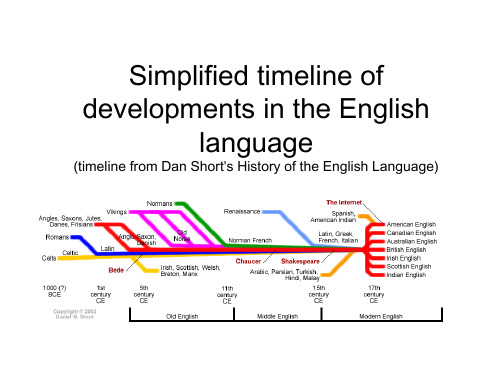
Simplified timeline of developments in the Englishlanguage(timeline from Dan Short's History of the English Language)•The history of the English language really started with the arrival of three Germanic tribes during the 5th century AD.• 3 tribes:the Angles, the Saxons and the Jutes At that time the inhabitants of Britain spoke a Celtic language.Old English (450-1100 AD)•The invading Germanic tribes spoke similar languages, which in Britain developed into what we now call Old English.•Old English did not sound or look like English today. Nevertheless, about half of the most commonly used words in Modern English have Old English roots.Middle English (1100-1500)•In 1066 the Normans invaded and conquered England.the Normans brought with them a kind of French, which became the language of the Royal Court, and the ruling and business classes.•For a period there was a kind of linguistic class division, where the lower classes spoke English and the upper classes spoke French.•In the 14th century English became dominant in Britain again, but with many French words added.Early Modern English (1500-1800)•Towards the end of Middle English, a sudden and distinct change in pronunciation started.•From the 16th century the British had contact with many peoples from around the world. This, and theRenaissance of Classical learning, meant that many new words and phrases entered the language.•The invention of printing brought standardization to English. Spelling and grammar became fixed, and the dialect of London, where most publishing houses were, became the standard.Late Modern English (1800-Present)•Late Modern English has many more words, arising from two principal factors: •firstly, the Industrial Revolution and technology•secondly, adoption of foreign words from many countries.。
History of the English Language

History of the English LanguageA short history of the origins and development of English The history of the English language really started with the arrival of three Germanic tribes who invaded Britain during the 5th century AD. These tribes, the Angles, the Saxons and the Jutes, crossed the North Sea from what today is Denmark and northern Germany. At that time the inhabitants of Britain spoke a Celtic language. But most of the Celtic speakers were pushed west and north by the invaders - mainly into what is now Wales, Scotland and Ireland. The Angles came from England and their language was called English- from which the words England and English are derived.Germanic invaders entered Britain on the east and south coasts in the 5th century.Old English(450-1100 AD)Part of Beowulf, a poem writtenThe invading Germanic tribes spoke similar languages,which in Britain developed into what we now call Old English. Old English did not sound or look like English today. Native English speakers now would have great difficulty understanding Old English. Nevertheless, about half of the most commonly used words in Modern English have Old English roots. The words be , strong and water , for example, derive from Old English. Old English was spoken until around 1100.Middle English(1100-1500)In 1066 William theConqueror, the Duke ofNormandy (part ofmodern France), invaded and conquered England. The new conquerors (called the Normans) brought with them a kind of French, which became the language of the Royal Court, and the ruling and business classes. For a period there was a kind of linguistic class division, where the lower classes spoke English and the upper classes spoke French. In the 14th century English in Old English. An example of Middle English by Chaucer.became dominant in Britain again, but with many French words added. This language is called Middle English. It was the language of the great poet Chaucer (c1340-1400), but it would still be difficult for native English speakers to understand today.Modern EnglishEarly Modern English(1500-1800) Towards the end of Middle English, a sudden and distinct change in pronunciation (the Great Vowel Shift) started, withvowels being pronounced shorter and shorter. From the 16th century the British had contact with many peoples from around the world. This, and the Renaissance of Classical learning, meant that many new words and phrases entered the language. The invention of printing also meant that there was now a common language in print. Books became cheaper and more people learned to read. Printing also brought standardization to English. Spelling and grammar became fixed, and the dialect Hamlet's famous "To be, or not to be" lines, written in Early Modern English by Shakespeare.of London, where most publishing houses were, became the standard. In 1604 the first English dictionary was published. Late Modern English (1800-Present)The main difference between Early Modern English and Late Modern English is vocabulary. Late Modern English has many more words, arising from two principal factors: firstly, the Industrial Revolution and technology created a need for new words; secondly, the British Empire at its height covered one quarter of the earth's surface, and the English language adopted foreign words from many countries. Varieties of EnglishFrom around 1600, the English colonization of North America resulted in the creation of a distinct American variety of English. Some English pronunciations and words "froze" when they reached America. In some ways, American English is more like the English of Shakespeare than modern British English is. Some expressions that the British call "Americanisms" are in fact original British expressions that were preserved in the colonies while lost for a time in Britain (for example trash for rubbish, loan as a verb instead of lend,and fall for autumn; another example, frame-up, wasre-imported into Britain through Hollywood gangster movies). Spanish also had an influence on American English (and subsequently British English), with words like canyon, ranch, stampede and vigilante being examples of Spanish words that entered English through the settlement of the American West. French words (through Louisiana) and West African words (through the slave trade) also influenced American English (and so, to an extent, British English).Today, American English is particularly influential, due to the USA's dominance of cinema, television, popular music, trade and technology (including the Internet). But there are many other varieties of English around the world, including for example Australian English, New Zealand English, Canadian English, South African English, Indian English and Caribbean English.。
- 1、下载文档前请自行甄别文档内容的完整性,平台不提供额外的编辑、内容补充、找答案等附加服务。
- 2、"仅部分预览"的文档,不可在线预览部分如存在完整性等问题,可反馈申请退款(可完整预览的文档不适用该条件!)。
- 3、如文档侵犯您的权益,请联系客服反馈,我们会尽快为您处理(人工客服工作时间:9:00-18:30)。
英语属于西日耳曼语支,起源于盎格鲁-弗里西亚方言,是在日耳曼人入侵时被引入不列颠的。
English is a West Germanic language that originated from theAnglo-Frisian dialects, broughtto Britain by Germanic invaders最初的古英语由多种方言组成,晚期西撒克逊语最终成为了统一英语的语言。
现代人所认识的英语,很大程度上和公元1400年的书面中古英语相似。
这种转变是由历史上两的入侵,他们在公元八、九世纪征服并使部分不列颠岛成为他们的殖民地。
第二次是十一世纪时来自诺曼人的入侵,他们讲的古诺曼语最终发展为英语的一种变体,称为盎格鲁-诺曼语。
Middle English differed from Old English because of two invasions which occurred during the Middle Ages. The 1st invasion was by peoples who spoke North Germanic languages. They conquered and colonized parts of Britain during the 8th and 9th centuries A.D. The 2nd invasion was by the Normans of the 11th century, who spoke Old Norman and eventually developed an English form thereofcalled Anglo-Norman.Proto-English英语诞生于日耳曼人的语言,主要包括盎格鲁语,撒克逊语,弗里西语,朱特语。
这其中还可能含有法兰克语,之后又融合了拉丁语。
The languages of Germanic peoples gave rise to the English language( the best known are the Angles, Saxons, Frisii, Jutes and possibly some Franks,) . Latin loan wordsentered the vocabulary.Old English – from the mid-5th century to the mid-11th century人们现在所讲的古英语是长期以来多个殖民部落的方言融合而形成的。
在盎格鲁-撒克逊入侵之后,日耳曼语言就取代了大不列颠某地区(现英格兰岛)上本土的布立吞语和拉丁语。
凯尔特语则在苏格兰、威尔士、康沃尔等地保留下来。
What is now called Old Englishemerged over time out of the many dialects and languages of the colonising tribes. After the Anglo-Saxon invasion, the Germanic language possibly displaced the indigenousBrythonic languages andLatin in most of the areas ofGreat Britainthat later became England. The originalCeltic languagesremained in parts ofScotland, Walesand Cornwall拉丁语也在这些地区作为凯尔特教堂用语、受过高等教育的人使用的高尚语言得以保留。
拉丁语后来还被凯尔特和罗马教堂的传教士重新引入英格兰,对英语语言产生很大影响。
Latin also remained in these areas as the language of the Celtic Church and of higher education for the nobility. Latin was later to be reintroduced to England by missionaries from both the Celtic and Roman churches, and it would, in time, have a major impact on English.作为一门日耳曼语言,大约有一半的现代日常用词具有古英语词根。
像 be, strong 以及 water 这些词,都源自古英语。
Old English varied widely from modern Standard English. Native English speakers today would find Old English unintelligible without studying it as a separate language. Nevertheless, English remains a Germanic language, and approximately half of the most commonly used words in Modern English have Old English roots. The words be, strong and water, for example, derive from Old English.很多非标准的方言,如苏格兰语、诺森伯兰语都保留了古英语的词汇和发音特点。
[5]古英语的使用,一直延续到了十二或十三世纪。
公元十、十一世纪,古英语受到了属于北日耳曼语支的古诺尔斯语的强烈影响。
包括阴阳性的丢失、格的变化(代词除外)。
英语大约从古诺尔斯语借用了两千个词条,比如:anger, bag, both, hit, law, leg, same, skill, sky, take 等等,还可能包括代词 they。
由于公元六世纪晚期基督教的引入,超过400个拉丁词被借用引入英语,包括:priest, paper, school 等词,以及一些较少的希腊语词汇。
古英语时期正式结束是在1066年诺曼征服后,诺曼人开始大规模影响英语语言时。
诺曼人讲的是一种叫古诺曼语的法语方言。
Middle English – from the late 11th to the late 15th century我们现在所称的中古英语是指诺曼语的影响是英语在受侵略后发生语言大转变的体现。
The Middle English we called now means the language producing from Norman influence is the hallmark of the linguistic shifts in English over the period of time following the invasion.诺曼征服后的几个世纪内,诺曼的国王以及高层贵族曾一度流行奥依语,该语言属法语的一种,称盎格鲁-诺曼语。
其使用范围甚至扩张到了不列颠群岛的其他地方,并受到北方奥依语方言的影响。
商人和较低阶层的贵族曾经同时使用盎格鲁-诺曼语和英语,英语仍然被视为普通人使用的语言。
英语也受到被其取代的凯尔特语言的影响,特别是布立吞语的影响。
最明显的是“进行时”的引入,它是许多现代语言特征,但它是在英语中更早地、更充分地被发展的。
English was also influenced by the Celtic languages it was displacing, especially the Brittonic substrate, most notably with the introduction of the continuous aspect, which is a feature found in many modern languages but developed earlier and more thoroughly in English.英语文学在1200年后重新出现,受那时的政治氛围和盎格鲁-诺曼语言不断衰落的影响,英语变得愈加受尊重(即地位不再处于普通人的语言之列)。
1362年爱德华三世成为首个用英语发表英国国会演讲的国王。
到了十四世纪末,就连贵族阶层也开始使用英语。
到这一时期,盎格鲁-诺曼语变成仅在小圈子内部使用的语言,后来就不再活跃了。
英语语言在中古英语时期经历了沧桑巨变,这种变化同时体现在语法和词汇上。
古英语是一门严重受到其他语言影响的语言,非常纷繁复杂。
但在中古英语时期,发生了词尾的全面精简。
大量的名词和形容词的词尾被简化为 -e,原有的语法差异随之遗失。
曾用于表示复数形式的词尾 -en 被大量简化为 -s,词的阴阳性被遗弃。
中古英语从法语(也有诺曼语)借用了大约一万个词,特别是政府、交通、法律、军队、时尚和饮食方面的词汇。
The English language changed enormously during the Middle English period, both in grammar and in vocabulary. While Old English is a heavily inflected language (synthetic), an overall diminishing of grammatical endings occurred in Middle English (analytic). Grammar distinctions were lost as manyand grammatical gender was discarded. Approximately 10,000 French (and Norman) loan words entered Middle English, particularly terms associated with government, church, law, the military,Early Modern English – from the late 15th to the late 17th century英语语言在十五世纪时,拼写方面已经相对稳定了,但语音上经历了许多巨大变化。
现代英语的语音的发展通常认为可追溯到开始于14世纪,大体完成于15世纪中期的元音大推移。
英语语音后来又在政府所用的以伦敦口音为基础的方言,以及印刷行业的的影响下产生变形。
